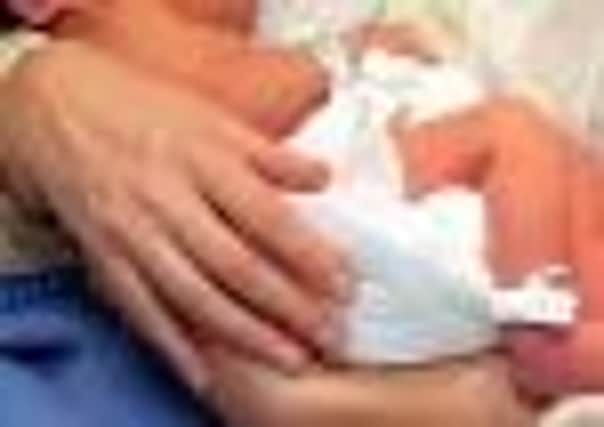Not in the mood: recession puts Scots off having babies


• Trend suggests economic uncertainty puts people off having children.
• Birthrate has fallen since 2008 as property crash took effect.
Advertisement
Hide AdAdvertisement
Hide AdThere were 14,688 born from the start of July to the end of September, more than the previous three months, but down on the same period last year.
Since the start of the recession, Scotland’s birth rate has continued to fall year on year, in a trend which suggests that economic uncertainty is putting people off of having children.
Scotland’s annual birthrate peaked in 2008, at 60,041. Many of those parents, with the nine-month time lag, would have become pregnant before the property crash too effect.
Since then that figure has fallen every year, and numbers in the first nine months of 2012 have also been lower, in total, than in the first nine of 2011.
Professor Robert Wright, an expert in demographics at Strathclyde University, said economic doom and gloom was putting couples of having children - but not as much as in other countries.
Baby Boom
“When you listen to the radio in morning, people go on and on about the how recession is still continuing,” he said.
“There’s been no economic improvement, so who would expect fertility to go up?
“However, the fact that fertility is not falling dramatically suggests that something else, something quite interesting, is happening.
Advertisement
Hide AdAdvertisement
Hide Ad“Fertility is higher in Scotland than many other countries with similar economies, including European ones.
“I guess we like kids here more than in other countries. In Hong Kong, the birth rate is half what the Scottish rate is.”
He was less confident of whether Scotland might experience a mini baby boom once the economy recovers and couples feel more confident.
“The interesting thing is what is going to happen in the future,” Professor Wright said.
“When good times roll maybe the fertility rate will increase.”
However, he warned that a more positive outlook for the economy didn’t necessarily mean a rise in the birthrate.
“We can expect a positive response to good economic times, but it’s not necessarily symmetrical and the change might be small to a decrease,” he said.
More than half of children are now born to unmarried couples, a big increase from a decade ago when it was around 45 per cent. However, this figure has not changed much in more recent years.
Encouraging
Advertisement
Hide AdAdvertisement
Hide AdAs usual, the number of marriages was high in the third quarter - more weddings consistently take place between July and September than any other quarter - and 11,635 across Scotland was only slightly lower than 2011, and higher than both 2009 and 2010.
While the death rate continues to fall slightly, year on year, 12,761 in the third quarter of 2012 was 143 higher than the same period in 2011.
The number of neonatal deaths fell to 32, its lowest quarterly figure in almost a decade, while 49 infant deaths was also one of the lowest figures in years.
However, the Scottish Government is keen to further reduce those numbers.
“The death of even one baby is a tragedy, however it is encouraging to see that rate of neonatal and stillbirth deaths remain low, but we want to drive the number of deaths down even further,” a spokeswoman said.
Record-keepers say the latest figures continue trends in place for the last few years.
Audrey Robertson, acting Registrar General for Scotland, said: “Today’s statistics show a fall in the number of births registered, with fewer than in the third quarter of each of the years from 2007 to 2011, inclusive.
“The number of births has tended to decline gradually over the recent years.”
Advertisement
Hide AdAdvertisement
Hide AdShe added: “There is usually some year-to-year fluctuation in the number of deaths.
“In 2011, Scotland recorded its lowest ever annual total 53,661, and it seems likely that the number registered in 2012 will be around one per cent above that level.”